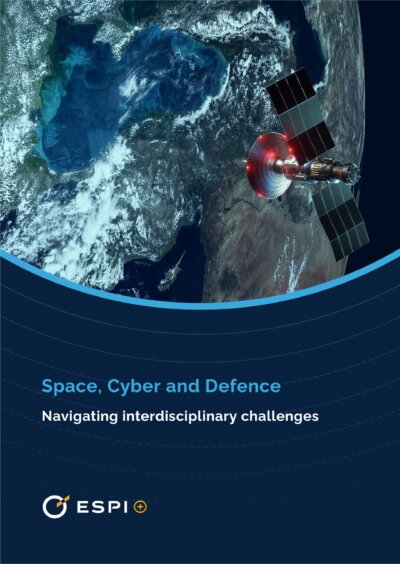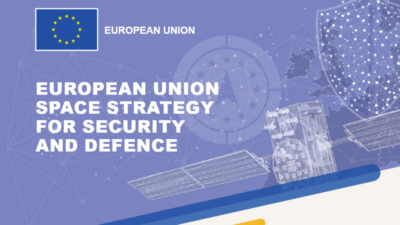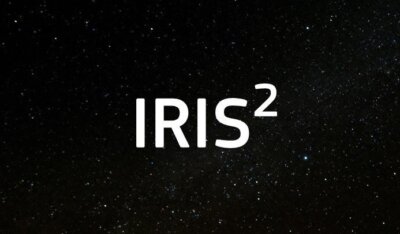Executive Brief No. 51
1. Space and Quantum: applications and synergies with ground technologies
In January 2021, at the 13th European Space conference, Commissioner Breton proposed the development of a European constellation for secured communications which, among other objectives, aims to: “project Europe into the quantum era, ensuring quantum encrypted communication”. This statement underlines the effort undertaken by the European Union in recent years to accelerate the development of quantum technologies, including quantum technologies in space.
Quantum technologies are increasingly perceived as an area of strategic relevance for Europe. The nascent quantum application field includes technologies based on laws that govern physics on a subatomic scale (quantum mechanics) that are expected to lead a new wave of innovations that could address many important ICT challenges, from secured networks to supercomputers. In space, there are four main areas of quantum applications: satellite-based quantum encryption (which includes Quantum Key Distribution), space-based Time and Frequency Transfer infrastructure (TFT), Earth-sensing and observation using atomic interferometry and finally fundamental sciences.
Quantum technologies have the potential to lead to a paradigm shift for secured communication standards and their development is now considered a strategic priority for Europe’s digital autonomy and sovereignty. Current advances in quantum computing are already posing a fundamental challenge to information security and contribute to growing cyber threats. Europe must be able to protect its critical infrastructures and cyberspace. To do so, quantum encryption technologies is a field of immediate strategic interest. Within this broad technology domain, the field of Quantum Key Distribution (QKD), which allows to secure networks by making eavesdropping more difficult, holds interesting promises for Europe.
The reason why space may play an essential role in technologies like QKD stems from the major limitations of quantum communication networks on Earth. Quantum signals are much weaker than RF and optical signals and cannot be transferred without losing a share of the information. In space, it is possible to obtain a lower level of loss than in terrestrial fiber networks and consequently reach a much longer distance. Satellite-based quantum communications can cover large areas which makes this solution potentially more efficient than ground-based alternatives. Ideally, a Quantum Communication Infrastructure (QCI) would consist of a terrestrial segment relying on fibre communication networks linking strategic sites, and a space segment linking network nodes in Europe and/or across the globe.
2. Acceleration of Quantum Key Distribution developments in Europe
In recent years, China has taken the lead in the development of space-based Quantum Key Distribution capabilities. Chinese scientists have already established the world’s first integrated quantum communication network, combining over 700 optical fibers on the ground with two ground-to-satellite links for quantum key distribution.
In a context of accelerating R&D efforts by other countries and increasingly hostile cyber environment, the EU has taken concrete steps to support the development of European QKD capabilities, including for a space component, in view of developing an integrated European infrastructure.
- In 2018, the EU launched the Europe Quantum Technologies Flagship programme with a budget of €1 billion over 10 years, with the objective to foster the development of critical quantum technologies in Europe.
- In 2019, seven EU Member States signed the EuroQCI Declaration, signalling their commitment to develop a pan-European Quantum Communication Infrastructure (EuroQCI) that will include a space-based component. As of 2021, all but 1 Member State have now ratified the declaration.
- The European Commission and ESA signed a working agreement for the development of the spacebased component of the EuroQCI known as SAGA (Security And cryptoGrAphic mission) which will fall under the responsibility of ESA and consists of a satellite quantum communication system with terrestrial reach.
- The EU also launched the €15 million Horizon 2020 project OPENQKD with the goal to develop a testbed allowing the validation and testing of multiple critical areas related to QKD development in Europe, including space technologies.
- In June 2021, the EC selected a consortium of companies and research institutions led by Airbus to design the future EuroQCI. The consortium aims to run a demonstrator mission by 2024 and begin initial operations by 2027.
3. Key questions for the EU approach to strategy autonomy and international partnership
With multiple applications highly relevant for European strategic objectives, QKD and Quantum technologies at large are promising areas of development for the European space sector. Recent developments on the EU front, in partnership with ESA and industry, confirm the serious ambitions and willingness of Europe to be positioned as a key player and potentially leader in this domain.
The central security dimension of quantum applications inevitably raises the question of Europe’s strategic autonomy. Recent declarations by Commissioner Breton confirmed the importance given by the EU to this aspect. Yet, there are important questions on how the European Union will concretely handle the matter.
At the latest G7 summit, Arqit, a UK quantum encryption technology startup which recently merged with a Special Purpose Acquisition Company (SPAC) and expecting to receive approx. €400 million in gross proceeds, announced that it has formed an international consortium of companies and institutions to provide its quantum encryption technology to government customers in a federated system concept, called Federated Quantum System (FQS). The UK, USA, Japan, Canada, Italy, Belgium, and Austria are part of this consortium. Arqit is also the lead contractor in partnership with ESA for the development of QKDsat, the first European QKD satellite (this partnership was initiated in 2018 prior to Brexit).
This announcement is certainly an important milestone for international partnership in the space quantum domain and a success for the European industry. However, European governments participation in both Arqit’s FQS and EuroQCI may raise some governance issues related to security concerns, in particular in the context of complicated relations between the UK and the EU. A parallel can be made with Commissioner Breton’s reaction to the recent €500 million investment by Eutelsat in UK-based OneWeb’s constellation which raised security-related concerns.
Beyond this situation, it is the question of the approach of the Union to strategic autonomy and international partnerships that is on the table. A few months ago, these considerations were already put under the spotlight when the EU considered to limit the availability of Horizon funding for quantum and space to EU member states. Such limitation seems to be now off the table but conditions for third countries participation and necessary insurances for the European Union are still unclear.
The space quantum domain may very well act as a catalyst for a number of strategic questions ahead of the EU and it makes no doubt that upcoming decisions will contribute to lay the foundations of EU’s future approach to strategic autonomy in space and at large.




